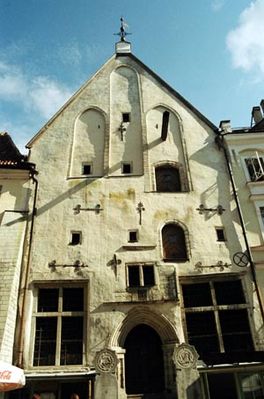Tallinn, Estonia
By Courtney Price
“Ei aeg meest oota,” says a smiling Estonian face. (Time doesn’t wait for man,) so you better hurry-up, Tallinn is waiting. The audible “oo’s” and “aa’s” of the language echo in your head. You find yourself repeating a phonetically different “oh,” and “ah.” You gaze down at peaceful Tallinn from Toompea, a hilltop fortress descending into the city’s Old Town district. People are wandering along narrow cobblestone walkways amidst centuries-old brick buildings. Overhead, the red roofs follow a distorted and twisting street layout where church steeples periodically pierce the sky. Framing this scene is the Town Wall connected by a series of huge towers. In a distant blue-green haze is the surrounding oak and birch landscape. You can smell, and almost taste, the sea air, and the aroma of the hearty cooking below. Medieval Tallinn, the capital of the Baltic state Estonia, is a journey through layers of time.
As you stroll down the hill to meet the city, you notice a cannonball-riddled tower aptly named Kiek in die Kok. I assure you it’s not a swift boot to the lower district of the body, but it is equally breathtaking. Like Kiek in die Kok and the immense Town Wall, much of the architecture in Tallinn served a protective purpose. The medieval seacoast centre had been sporadically attacked since its development in the 11th to 15th centuries. In 1991 a population weary of dominance wrestled independence from the Soviet Union.
As you continue to amble, you feel like you are walking through history. Tallinn exudes a connection to the past, where every second seems slower, the days longer and more enjoyable. Estonians can boast that their capital has been recognized by UNESCO’s World Heritage List as a truly distinctive cultural area. The people of Tallinn exude genuine kindness that immediately wins your heart. In a display of outright friendliness, or sheer insanity, a Nordic beauty stops to share a story ending with a kiss for the wandering traveler before continuing down the street. Estonians’ traditional good nature is evident in year-round festivals, even though Tallinn seems to celebrate daily.
Slow your pace and sit in the shadow of the Gothic town hall. Have a Saku, (Estonian beer.) Eat some vorst and leiba (sausage and bun.) Come exist in a charming life where the scenery is peppered with friendly strangers. Estonians share a bond to their rich past, which is fortified by their language. Just don’t be intimidated by 20 letter words or the ever-frequent double vowel. You get used to the language and its subtle vulgarities; you may even pick up some. Spend enough time in Tallinn and your “oh’s” and “ah’s” will turn into “oo’s and “aa’s.”
Featured Articles
by Trevor Payne There was really no point in going to bed. We would be setting off for a midnight trek in several hours anyways.
by Stephanie Devine "Bützje!" was all I heard before I felt two burly hands grip either side of my face and pull me in for a kiss.
By Courtney Price. “Ei aeg meest oota,” says a smiling Estonian face. (Time doesn’t wait for man,) so you better...
By Nada Jaksic. Ten years had passed since I last watched its palms sway in the mild warm breeze. A decade had drifted since...
Free Backpacking Europe Planning & Essentials Guide
Download/More info on the Backpacking Planning and Essentials Guide
Featured Articles
by Trevor Payne There was really no point in going to bed. We would be setting off for a midnight trek in several hours anyways.
by Stephanie Devine "Bützje!" was all I heard before I felt two burly hands grip either side of my face and pull me in for a kiss.
By Courtney Price. “Ei aeg meest oota,” says a smiling Estonian face. (Time doesn’t wait for man,) so you better...
By Nada Jaksic. Ten years had passed since I last watched its palms sway in the mild warm breeze. A decade had drifted since...
Free Backpacking Europe Planning & Essentials Guide
Download/More info on the Backpacking Planning and Essentials Guide






